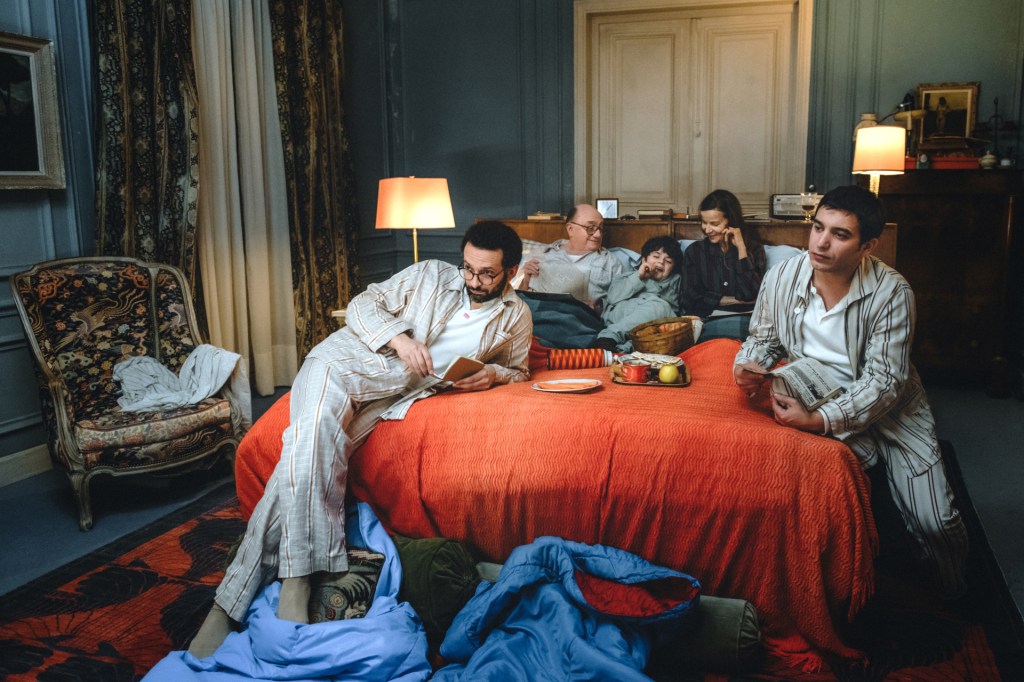Memories can’t be cancelled. The Boltanski family never celebrates significant dates, even their own birthdays; according to the narrator who leads us into this whimsical fantasy of post-war Jewish life, they live only for the present moment. In May 1968, the present moment consists of riots in the streets and demands for the government to step down, although it is the utopian dreams on the posters slapped up on walls that embody the movement’s true spirit: “Beauty is in the streets!” “Banning is banned!”. One of the Boltanski sons is out there at the Sorbonne with his wife, changing the world; the rest of the family are together in their house in Paris, where they like to huddle in one room, eating assortments of snacks on the bed while the revolution is televised.
In fact, the past is stuck in the house’s every crack. Knick-knacks from menorahs to playbills of Josephine Baker are jammed in every corner. Great-Grandmama lives upstairs with Prokofiev blasting from her record player, her room a little preserved corner of Odessa in 1913. And why does Grandpapa dive under the table when he sees a policeman? On the one hand, Lionel Baier’s comedy is a great croquembouche of cute characters and whimsy. On the other hand, it is about terror.
Grandpapa (Michel Blanc) is a general practitioner, skilled with the deluded; we watch him handle an old woman, who claims to have put a spoon in her vagina to divert Chinese surveillance equipment, with remarkable tact. Grandmama (Dominique Reymond) is bound each day into the leather leg brace that makes it possible for a polio victim to walk, but refuses to consider herself disabled. Grandmama, a Gentile from old French money, is quite the revolutionary heroine herself.
She is also the queen of the family car, a tiny Citroen Ami where the whole family crowds in for her Mr. Magoo-like negotiations of Paris’s cobbled byways and she makes tea in a pot on the dashboard. Usually riding shotgun is her nine-year-old grandson (Ethan Chimienti), wearing the favorite new coat he discovered in his great-grandmamma’s wardrobe: a check jacket with a large gold star on the pocket. No one says he shouldn’t wear it. Let the neighbors, who tried to turn them in 25 years ago, see that star run free!
Two adult sons still live at home among the piles of books, relics and pictures of the Ballets Russes. One is a linguist — whose day is coming, as we are allowed to see, when his arcane discipline becomes the academic rage in the ’70s — while the other is an artist about to have a show he predicts, gloomily, will be scuppered by the general strike. The third son is the boy’s father. He and his partner are known only as “the boy’s parents” as if being punished, the narrator tells us, for living elsewhere. The boy stays with his grandparents while they are out changing the world, one Molotov at a time. He cries as he sees them leave wearing family’s old wartime gasmasks. Grandmama shushes him. “There can be no sadness in this house,” she says.
Reymond is a marvel as Grandmama, exuding a serenity that is the aftermath of survival; Blanc is equally good as Grandpapa, whose scrabblings under the table could seem ridiculous or pathetic — and are certainly written for laughs — but that he makes genuinely poignant. It is easy for subsequent generations to overlook the fact that the war was a vividly living memory in 1968, the evidence of destruction still strewn across Europe; the moving force of 1968 was set on sweeping away fascism’s tailings.
When the Boltanskis are obliged to welcome in a very illustrious politician seeking respite from the fracas outside, that circle closes; Grandpapa sits with the visitor in the shelter where he once hid from the Gestapo, remembering how Charles de Gaulle’s radio broadcasts from Britain sustained him. “That was the voice of my country,” he says. “And that voice is in the streets now.”
The arrival of the visitor pushes the film’s magical thinking into a heightened fantasy which, arguably, weakens it. It does have something of the flavor of that plethora of children’s books about having tea with the Queen at Buckingham Palace, which is — or rather was — considerably more likely than what happens here. It’s all very charming, but there is such a thing as too much Gallic charm, just as there can be too much of many good things in a croquembouche. Accept it for the gooey pleasure it is, however, and you can simply believe everything. As Grandpapa says, there’s nothing wrong with having a good imagination: it gives luster to a life that might otherwise seem dull. And there is nothing dull about life in The Safe House.
Title: The Safe House [La Cache]
Festival: Berlin (Dramatic)
Director: Lionel Baier
Screenwriters: Lionel Baier, Catherine Charrier
Cast: Dominique Reymond, Michel Blanc, William Lebghil, Aurélien Gabrielli, Liliane Rovère
Sales agent: mK2 Films
Running time: 1 hr 30 mins



